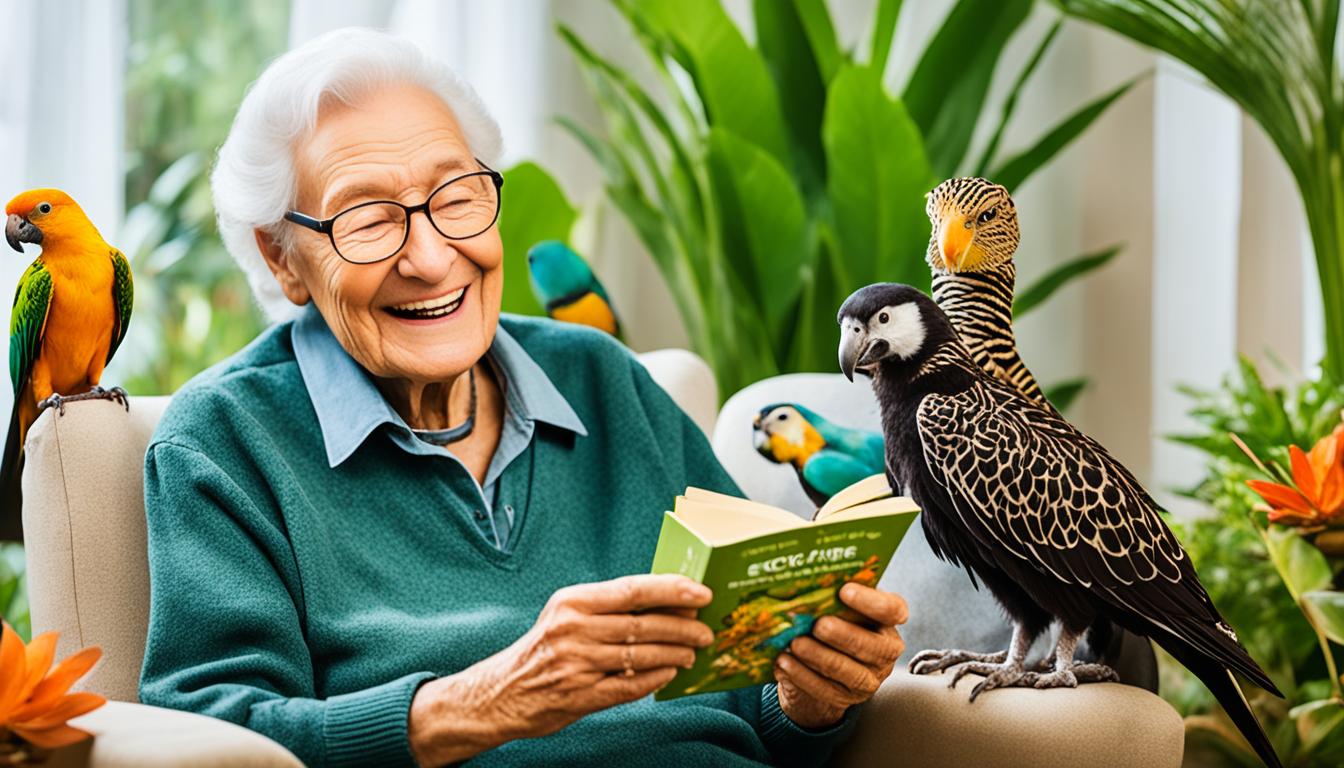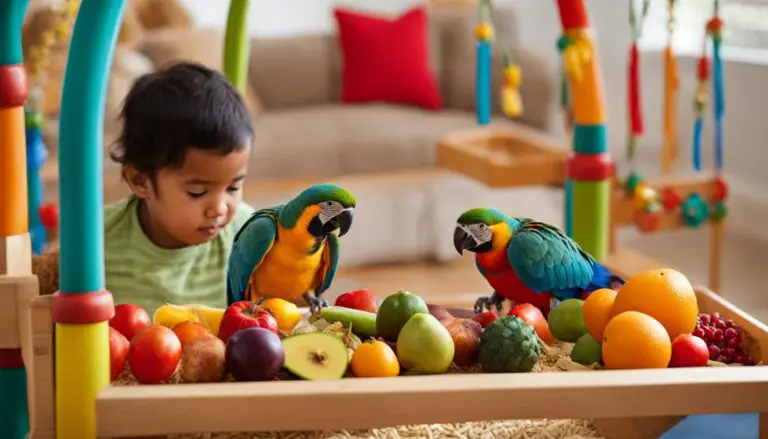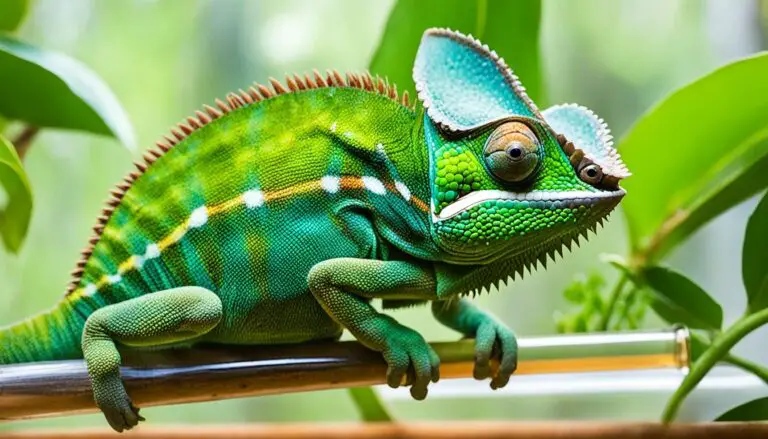Exotic Pet Care for Seniors: Tips & Insights
As seniors age, they often find companionship and joy in owning pets. While cats and dogs are popular choices, many seniors are opting for more unique and exotic pets. However, caring for exotic pets requires specialized knowledge and attention to their unique needs. In this article, we will provide tips and insights on exotic pet care for seniors, ensuring a safe and enjoyable companionship. We will cover topics such as understanding exotic pets and their unique needs, the benefits of pets for the elderly, senior-friendly pet care, senior pet health, establishing a routine and environment for exotic pets, navigating veterinary care, and more.
Key Takeaways:
- Exotic pet care for seniors requires specialized knowledge and understanding of their unique needs.
- Pets can provide companionship and improve the overall wellness of elderly individuals.
- Choosing the right exotic pet for seniors is important based on their lifestyle and capabilities.
- Creating a senior-friendly pet care routine and environment is essential for the well-being of both the senior and the exotic pet.
- Navigating veterinary care for exotic pets may require finding experienced veterinarians who specialize in exotic animal care.
Understanding Exotic Pets and Their Unique Needs
Exotic pets, such as reptiles, birds, and small mammals, have specific requirements that differ from traditional pets like cats and dogs. It is essential for seniors to understand these unique needs to provide appropriate care for their exotic pets. We will discuss the different types of exotic pets, their natural habitats, dietary needs, temperature requirements, and overall care tips to ensure their well-being.
| Exotic Pet | Natural Habitat | Dietary Needs | Temperature Requirements |
|---|---|---|---|
| Reptiles (e.g., snakes, lizards) | Deserts, rainforests, grasslands | Varying diets, including live prey or fruits/vegetables | Requires specific temperature gradients for proper thermoregulation |
| Birds (e.g., parrots, cockatiels) | Tropical rainforests, savannas | Varied diet of seeds, fruits, vegetables, and occasional insects | Requires warm, stable temperature inside their cages |
| Small Mammals (e.g., guinea pigs, hamsters) | Grasslands, forests | Herbivorous diet of hay, fresh fruits/vegetables, and pellets | Requires consistent room temperature, without extreme fluctuations |
Understanding the natural habitats and dietary needs of exotic pets is crucial for providing them with a nurturing environment. Seniors should ensure that their pets’ enclosures or habitats mimic their natural surroundings as closely as possible, allowing them to thrive and stay healthy.
Maintaining the appropriate temperature for exotic pets is also vital. These pets often have specific temperature requirements to support their physiological processes. Seniors should invest in appropriate heating or cooling equipment, such as heat lamps or temperature-controlled enclosures, to create a comfortable environment for their exotic pets.
In addition to dietary and temperature needs, exotic pets require regular veterinary care, mental stimulation, and social interaction. Providing an enriching environment with appropriate toys, exercise opportunities, and interaction is essential for their overall well-being.
Benefits of Pets for the Elderly: Companionship and Wellness
Owning a pet can have numerous benefits for seniors, providing them with companionship, emotional support, and improved overall wellness. Whether it’s a furry feline, a lovable canine, or even an exotic companion, pets can bring joy and positivity to the lives of older adults.
The Therapeutic Impact of Senior Pet Ownership
Studies have shown that senior pet ownership has various therapeutic impacts on mental health, physical activity, and social interactions. Pet companionship has been linked to reduced stress levels, decreased feelings of loneliness and depression, and increased feelings of happiness and overall well-being. Having a pet around can provide a sense of purpose and routine, helping seniors to maintain a sense of structure in their daily lives.
Additionally, owning a pet encourages physical activity, as seniors must engage in regular walks and playtime with their furry friends. This increased physical activity can help improve cardiovascular health, increase muscle strength and flexibility, and even lower blood pressure. Regular physical exercise, even in small amounts, can contribute to the prevention of various health conditions and promote longevity.
Furthermore, pets serve as social catalysts for seniors, helping to foster new connections and relationships. Taking a dog for a walk or visiting a dog park provides opportunities for interaction with other pet owners and community members, leading to increased socialization and reduced feelings of isolation. Pets can spark conversations and offer a shared interest, giving seniors a chance to engage with others and form meaningful connections.
Choosing the Right Exotic Pet for Seniors
When it comes to selecting an exotic pet for seniors, it’s important to consider their lifestyle, preferences, and capabilities. Exotic pets can range from reptiles and birds to small mammals, each requiring unique care and attention. Seniors should opt for pets that match their level of commitment and ability to meet the specific needs of the species.
Some factors to consider when choosing an exotic pet for seniors include:
- Size and space requirements: Ensure that the pet’s enclosure or living space is suitable for the senior’s living arrangements.
- Maintenance and care: Consider the time and effort required to properly care for the exotic pet, including feeding, cleaning, and regular veterinary check-ups.
- Compatibility: Assess the compatibility of the pet with the senior’s lifestyle and any existing pets or family members.
- Special considerations: Some exotic pets may have specific dietary or environmental needs that seniors should be prepared to provide.
Consulting with experienced exotic pet owners or seeking guidance from reputable exotic pet organizations can help seniors make an informed decision and find the right exotic pet that fits their lifestyle and capabilities.

Senior-Friendly Pet Care: Adapting to Age-Related Changes
As seniors age, they may experience physical limitations and age-related changes that require adjustments in pet care routines. It is important to ensure the well-being of both the senior and their exotic pet by implementing senior-friendly pet care tips and adaptations.
Here are some key considerations for senior-friendly pet care:
- Feeding schedules: Establish a consistent feeding schedule for your pet to ensure they receive the appropriate nutrition. Consider using automatic feeders or enlisting the help of a caregiver or family member if needed.
- Grooming practices: Adapt grooming practices to accommodate any physical limitations. Explore low-maintenance pet breeds or seek professional grooming services to ease the burden of grooming tasks.
- Exercise routines: Customize exercise routines to accommodate the senior’s physical abilities and their pet’s exercise needs. Short, gentle walks or interactive play sessions can still provide stimulation and promote physical well-being.
- Creating a safe environment: Ensure the home environment is safe for both the senior and their pet. Remove any hazards that could cause trips or falls, secure loose cords or wires, and consider using pet gates to restrict access to certain areas.
By making these adjustments, seniors can continue to enjoy the benefits of pet ownership while ensuring the safety and well-being of both themselves and their beloved pets.
Senior Pet Health: Preventative Measures and Regular Check-Ups
Maintaining the health of senior pets is crucial to their overall well-being. As pets age, they may be more prone to certain health issues and require additional care. Regular check-ups and preventative measures are essential to identify and address potential health problems early on. By prioritizing their health, senior pet owners can ensure that their furry companions enjoy a healthy and happy life.
Importance of Bi-Annual Wellness Exams
Bi-annual wellness exams are a vital aspect of senior pet care. These regular check-ups allow veterinarians to assess the overall health of the pet and detect any potential issues. During these exams, various aspects of your pet’s health will be evaluated, including:
- Physical examination to check for any signs of illness or discomfort
- Dental evaluation to address any dental disease or oral health issues
- Blood tests to check for any abnormalities or underlying health conditions
- Urinalysis to assess kidney function and monitor for urinary tract infections
- Vaccination updates to ensure your pet is protected against preventable diseases
By scheduling bi-annual wellness exams for your senior pet, you can stay proactive in their healthcare and catch any potential problems early, maximizing the chances of successful treatment and management.
Tailored Arthritis Management for Senior Pets
Arthritis is a common condition among senior pets, causing discomfort and mobility issues. It is crucial to implement tailored arthritis management strategies to improve their quality of life. These may include:
- Supplementing their diet with joint-supporting nutrients
- Providing a comfortable and supportive bed
- Ensuring regular and gentle exercise to maintain joint flexibility
- Managing their weight to reduce stress on the joints
- Utilizing prescribed medications or pain-relief treatments as recommended by the veterinarian
By addressing arthritis promptly and implementing appropriate management techniques, you can help alleviate pain and improve the overall mobility and well-being of your senior pet.

Exotic Pet Care for Seniors: Establishing a Routine and Environment
Creating a stable and comfortable routine for exotic pets is essential for their overall happiness and well-being. Seniors who own exotic pets need to provide consistent care that meets their unique needs. Establishing a routine that includes a regular feeding schedule, exercise routine, and mental stimulation is crucial for the well-being of these pets.
Feeding schedules should be consistent to maintain optimal nutrition and prevent digestive issues. Seniors should consult with a veterinarian to determine the appropriate diet for their exotic pet, as different species have different dietary requirements. It’s important to follow the recommended feeding guidelines and avoid overfeeding to prevent obesity and related health problems.
Regular exercise is essential for keeping exotic pets physically and mentally stimulated. Seniors should provide opportunities for their pets to engage in natural behaviors and encourage physical activity. This can include supervised playtime, interactive toys, and the provision of safe climbing or exploring spaces. Engaging in appropriate activities will help prevent boredom and support the overall health and well-being of the pet.
Creating a suitable pet environment is also crucial for the well-being of exotic pets. Seniors should ensure that the pet’s enclosure or habitat meets the specific needs of the species. This includes providing appropriate temperature regulation, suitable substrates or bedding, and adequate hiding spots or perches for the pet to feel secure. It’s important to research and understand the environmental requirements of the specific exotic pet to provide a comfortable and enriching living space.
| Establishing a Routine and Environment for Exotic Pets | Key Considerations |
|---|---|
| Feeding Schedule |
|
| Exercise Routine |
|
| Pet Environment |
|
Navigating Veterinary Care for Exotic Pets
Finding appropriate veterinary care for exotic pets can be challenging. These non-traditional pets have unique needs and require specialized care. As a senior pet owner, it is crucial to ensure that your exotic pet receives the proper medical attention and treatment when needed.
Selecting Experienced Veterinarians for Exotic Animals
When it comes to exotic pet care, it is essential to select veterinarians who have experience and expertise in treating these unique animals. Not all veterinarians are trained to handle exotic pets, so it’s crucial to find a veterinary clinic or hospital that specializes in exotic animal care.
When choosing a veterinarian for your exotic pet, consider the following:
- Look for veterinarians who have completed additional training or certification in exotic animal medicine.
- Inquire about their experience with the specific type of exotic pet you have.
- Ask for referrals or recommendations from other exotic pet owners.
- Consider the location of the veterinary clinic or hospital and the availability of emergency services.
By selecting an experienced veterinarian, you can have peace of mind knowing that your exotic pet will receive the best possible care.
Understanding the Significance of Preventive Veterinary Visits
Preventive veterinary visits are crucial for maintaining the health and well-being of exotic pets. Regular check-ups allow veterinarians to detect any underlying health issues early on and provide appropriate treatments.
During preventive veterinary visits, the veterinarian will:
- Perform a thorough physical examination of your exotic pet.
- Check for any signs of illness or disease.
- Provide vaccinations, if necessary.
- Discuss diet, nutrition, and overall care for your exotic pet.
Regular veterinary visits also give you the opportunity to ask any questions or concerns you may have about your exotic pet’s health and well-being. It is essential to follow the veterinarian’s recommendations for follow-up visits and any necessary treatments or medications.
Remember, preventive veterinary care is key to keeping your exotic pet happy and healthy for years to come.
| Benefits of Selecting Experienced Veterinarians | Significance of Preventive Veterinary Visits |
|---|---|
|
|
Conclusion
In conclusion, caring for exotic pets as a senior can be a rewarding experience. Understanding their unique needs is crucial to providing them with the proper care and attention they require. By following the tips and insights provided in this article, seniors can ensure that their exotic pets thrive in a senior-friendly environment.
Senior pet owners must prioritize the health and wellness of their furry companions. Regular veterinary check-ups, tailored arthritis management, and preventive measures are essential for maintaining the well-being of senior exotic pets.
Remember, exotic pets can bring immense joy and companionship to seniors. Providing them with a stable routine, a suitable environment, and lots of love and affection will result in a fulfilling and enriching bond. Care and attention are vital to ensuring the happiness and well-being of both the senior and their unique exotic pet.
Source Links
- https://www.clearlakevetclinic.com/site/blog/2023/01/08/how-to-properly-care-for-exotic-pets
- https://www.dvm360.com/view/senior-care-toolkit
- https://www.bethanyvet.com/senior-pet-care-nurturing-your-beloved-companions-golden-years
Peter Stones is the founder of Exotic Pets Place, the leading online resource for exotic pet care information.
With over 10 years of hands-on exotic pet ownership experience, he is deeply passionate about sharing his expertise to help others properly care for their unusual pets.
When he's not writing extensively researched articles or connecting with fellow exotic pet enthusiasts worldwide, you can find Peter at home tending to his own beloved menagerie of exotic animals.







